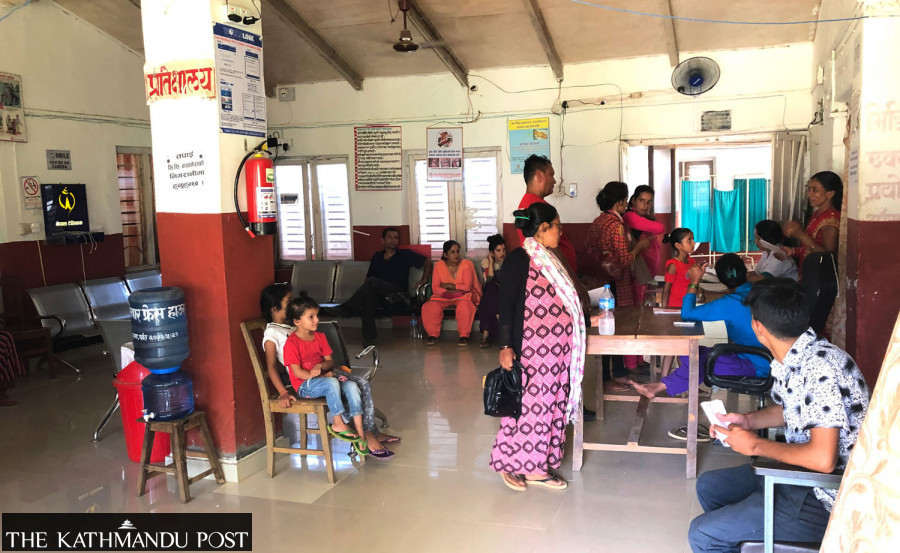Health
Cases of seasonal flu and waterborne diseases are rising
Season change, contaminated water, food poisoning, and lack of awareness have been blamed for the rise in cases.
Arjun Poudel
Of the total patients visiting the outpatient department at the District Hospital Humla every day, around one fourth have been suffering from diarrheal diseases.
Seasonal flu, chronic obstructive pulmonary disease, pneumonia, and jaundice are other problems that people are suffering from, according to hospital records.
“Cases of seasonal diseases have risen several folds in Humla in recent days,” said Dr Dev Gajamer of the District Hospital Humla over the phone from Simikot, headquarters of the district, earlier this week. “Over 80 patients visit the outpatients department of the hospital every day.”
With the rise in the temperature, patients of seasonal diseases have increased throughout the country including in Kathmandu Valley.
According to the administration at the Sukraraj Tropical and Infectious Disease Hospital, 15 to 20 patients suffering from diarrheal diseases visit the hospital’s emergency every day.
“To deal with the rising number of diarrheal patients, we have started a separate gastro ward at our hospital,” said Nabaraj Gautam, information officer at the hospital. “Cases of viral fever, and other seasonal diseases are also on raise.”
Contaminated drinking water, rising pollution, food poisoning, and lack of awareness have been blamed for the increasing cases of seasonal diseases.
Doctors at the Kanti Children’s Hospital in Kathmandu said the number of patients has risen five folds in the last one month.
“Over 1,000 patients visit the outpatients department of our hospital every day,” said Dr Yuba Nidhi Basaula, director at the hospital. “And, cases of diarrheal diseases, seasonal flu and fever are high.”
The Epidemiology and Disease Control division, which is responsible for containing the epidemic throughout the country, said that it has alerted health workers about the possible risks.
“As this is the marriage and bratabandha season and there is feasting involved, the problems related to food poisoning also grow,” said Dr Chuman Lal Das, director at the Epidemiology and Disease Control Division. “We have alerted the relevant agencies about the risks.”
Most health workers have been deployed in the fight against the Covid pandemic for the last two years and they are still busy in vaccination drives against Covid and recently typhoid. Now the same health workers need to deal with seasonal outbreaks and regular health care problems.
Doctors say even if it is normal for cases of seasonal diseases to rise after a season change, the increase in such cases especially in remote areas like in Humla that lack even basic health care services, is concerning.
“People from our district do not have access to the health care services,” said Sarita Bohara, chief of Health Office, Humla. “But more people with seasonal diseases including many seriously ill have been visiting the district hospital.”
People in Humla are deprived of most of the basic necessities, such as drinking water, basic health care services, nutritious food, sanitation and basic education. People are dying from easily treatable and preventable diseases, such as flu, asthma and diarrhoea.
There are alot of existing challenges—malnutrition, respiratory problems, lack of access to roads and a dearth of skilled workers.
According to the latest human development index report, Humla is among the most deprived districts in terms of health, education and sanitation. Life expectancy at birth in the district is just 58 years compared to the national average of over 70 years.
Doctors say authorities concerned should be conscious about the new problems and do their best to prevent outbreaks.
“Death from any disease is a loss and authorities concerned should make every effort to prevent disease outbreaks and deaths,” said Dr Sher Bahadur Pun, the chief of the Clinical Research Unit at Sukraraj Tropical and Infectious Disease Hospital. “While focussing on the new emerging diseases and risks, authorities should not ignore the risk of seasonal diseases.”




 22.12°C Kathmandu
22.12°C Kathmandu















